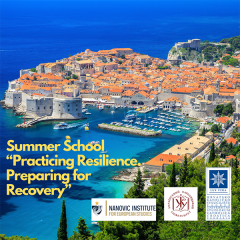Summer School “Practicing Resilience. Preparing for Recovery”
June 26-July 8, 2022 in Dubrovnik
 Monastery of the Sisters Servants of Mercy (Družba sestara Službenica Milosrđa)
Monastery of the Sisters Servants of Mercy (Družba sestara Službenica Milosrđa)
The Catholic University of Croatia in Zagreb and the Nanovic Institute for European Studies (University of Notre Dame) together with colleagues from the Ukrainian Catholic University in Lviv are organizing a 2 weeks summer school on the topics of resilience and (postwar) recovery.
The idea
The idea of the summer school is to bring Ukrainian students (many of whom are living in a diaspora outside of their home country) from the Ukrainian Catholic University together in a beautiful space, to facilitate encounters among international students, and to work on topics especially relevant for Ukraine and Europe more broadly.
We want to encourage learning and leisure in a beautiful and peaceful environment that has war and post war recovery experience itself. We want to offer intellectual, spiritual, social, and cultural depth and foster a spirit of community and solidarity. We want to create spaces for fostering personal well-being and self care.
Content
The first week of the summer school will be dedicated to the topic of resilience, the second one to the topic of (post war) recovery.
Resilience research has become a powerful multidisciplinary exercise with many angles and a growing body of publication outputs. The ability to successfully cope with adversity has been identified as a key human capability and it is discussed whether and how it can be strengthened, learnt, communicated. Wars and violent conflicts are among the most severe tests of resilience, especially if conflicts are prolonged and the resilience required is a marathon, not a sprint. Given the Russian invasion of Ukraine there is a new urgency to the question: how can resilience be supported in times of war? The case of Ukraine also shows that there is a lot that can be learnt from Ukraine and the resistance and resilience shown by Ukrainians. We want to take a closer look at resilience studies, and at the nurturing of social, institutional and personal resilience.
The second week will be dedicated to aspects of recovery. The destructive force and traumatizing effects of war are undisputed. Both the intangible infrastructure of people (imagination and ideas, emotions, beliefs, values) and the tangible infrastructure of a country (physical environment) are threatened and damaged by violence and wars. We will draw on examples and lessons from postwar recovery (including the history of Croatia and Bosnia), we will look at aspects of responding to trauma, memory and remembering, possible avenues for new beginnings in social and political lives.
Capstone project
The key learning outcome of the summer school will be a capstone project. In this project students should translate their interest in the topics of resilience and (post-war) recovery into an action plan which makes their knowledge relevant and applies their skills to the lived experience of people and institutions affected by adverse circumstances.



